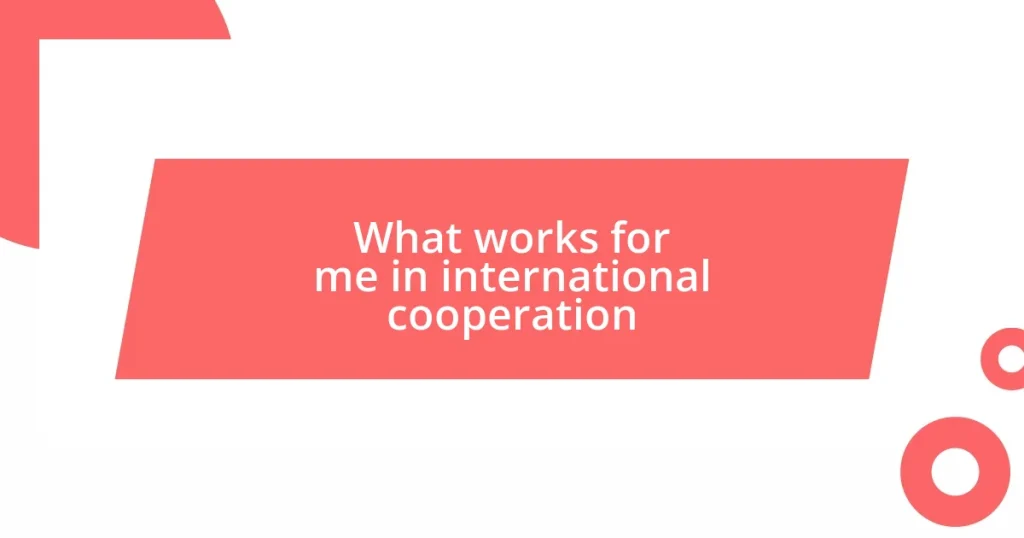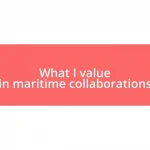Key takeaways:
- Effective international cooperation requires understanding diverse cultures, building trust, and fostering open communication, which can lead to stronger partnerships and innovative solutions.
- Clear goal-setting and regular evaluations are essential to maintain alignment and adaptability in collaborative projects, creating a sense of ownership among stakeholders.
- Sharing successes and challenges openly enhances team dynamics, encourages problem-solving, and reinforces the importance of celebrating small victories to boost morale and commitment.
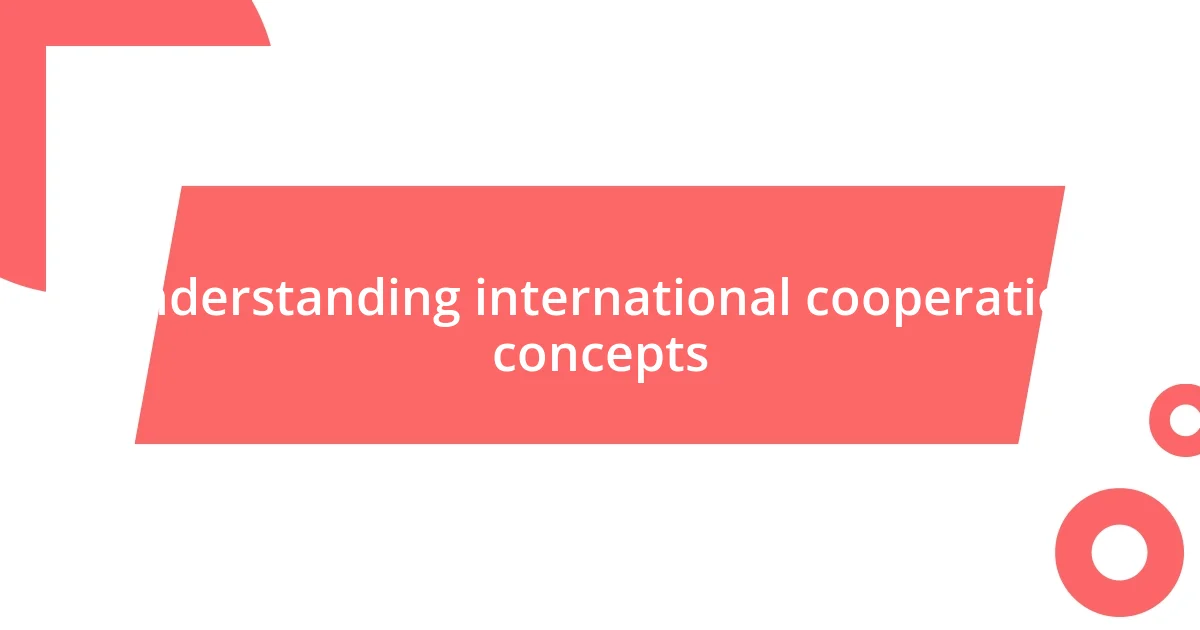
Understanding international cooperation concepts
Understanding international cooperation concepts isn’t just about memorizing definitions. For me, it’s about recognizing the intricate web of relationships that shape our world. I recall a time when collaborating with individuals from diverse backgrounds opened my eyes to different values and perspectives. Have you ever experienced that “aha” moment when someone from a different culture shares their viewpoint? It transforms how you see cooperation.
At its core, international cooperation involves mutual interests and shared goals among countries. I’ve found that when nations come together to tackle global issues—like climate change or peacebuilding—their combined efforts can lead to remarkable outcomes. Isn’t it fascinating how diverse challenges can unite us?
But let’s not forget the emotional weight that comes with these partnerships. I remember a project I was a part of where we worked alongside a team from a conflict-affected region. The sense of camaraderie and shared purpose in that room was electric. It made me realize that behind every partnership lies a human story, often filled with hopes and dreams for a better future. Isn’t that what makes international cooperation so compelling?
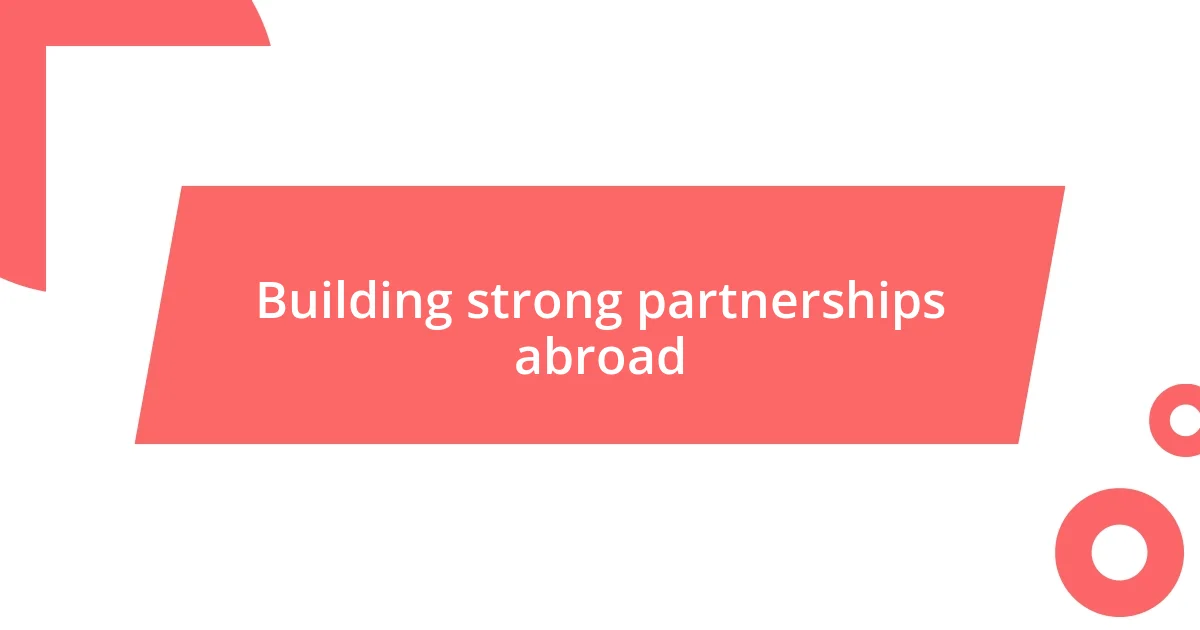
Building strong partnerships abroad
Building strong partnerships abroad is about more than just networking; it requires trust and a mutual understanding of each other’s cultures. I remember my first project overseas, working alongside a local team in a small village. Initially, there was a language barrier, but as we shared meals and stories, the connection deepened. This experience taught me that sometimes, a shared cup of coffee can break more barriers than any formal meeting ever could.
Moreover, active listening plays a crucial role in nurturing these partnerships. When I participated in an international conference, I made it a point to engage with attendees, not just through dialogue but by truly hearing their stories. This genuine interest fostered excitement and ultimately led to collaboration on a significant environmental initiative. Could it be that the key to effective partnerships lies in our willingness to listen and connect authentically?
Furthermore, having a shared vision is essential for long-lasting alliances. There was a campaign I joined where diverse stakeholders, from governments to NGOs, rallied around a common goal. This collective energy was palpable. It made me reflect on how powerful it can be when different sectors come together, demonstrating that unity in purpose truly enhances our capacity to tackle challenges together.
| Partnership Elements | Importance |
|---|---|
| Trust | Fosters open communication and collaboration |
| Active Listening | Enhances understanding and connection |
| Shared Vision | Unifies efforts towards common goals |
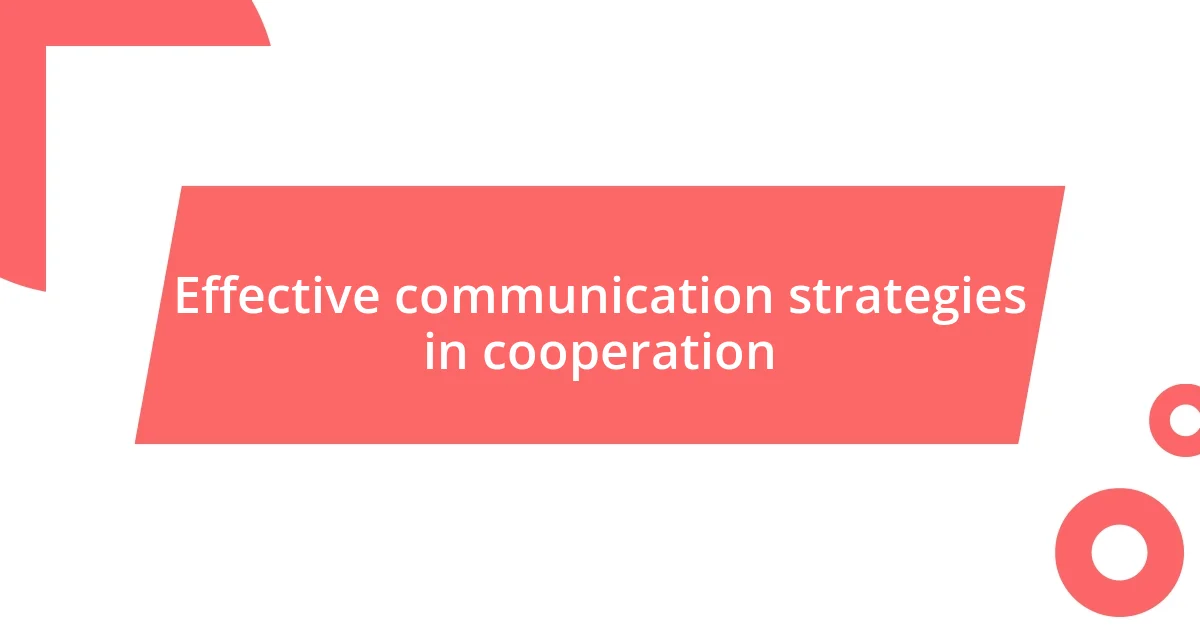
Effective communication strategies in cooperation
Effective communication is the heartbeat of successful international cooperation. I recall a negotiation session where our team faced significant cultural differences. Instead of letting misunderstandings create tension, we paused and took the time to express our thoughts clearly, using visuals and simple language. This effort transformed a potentially contentious meeting into a productive dialogue, reminding me how clarity can foster trust and collaboration.
As I think about communication strategies, here are a few that have proven effective for me:
- Use Clear and Simple Language: Avoid jargon and elaborate terms. Simplicity facilitates understanding.
- Leverage Technology: Utilize tools like video conferencing and collaborative platforms to connect effectively across distances.
- Be Culturally Sensitive: Understand and respect cultural nuances in communication styles; this creates an inclusive atmosphere.
- Encourage Open Dialogue: Create spaces where everyone feels comfortable sharing their thoughts, leading to richer discussions.
- Provide Context: Ensure that all parties have a shared understanding of the goals and background of discussions to prevent confusion.
Reflecting on these strategies, I’m reminded that communication isn’t just about exchanging information; it’s about forming connections that can withstand barriers.
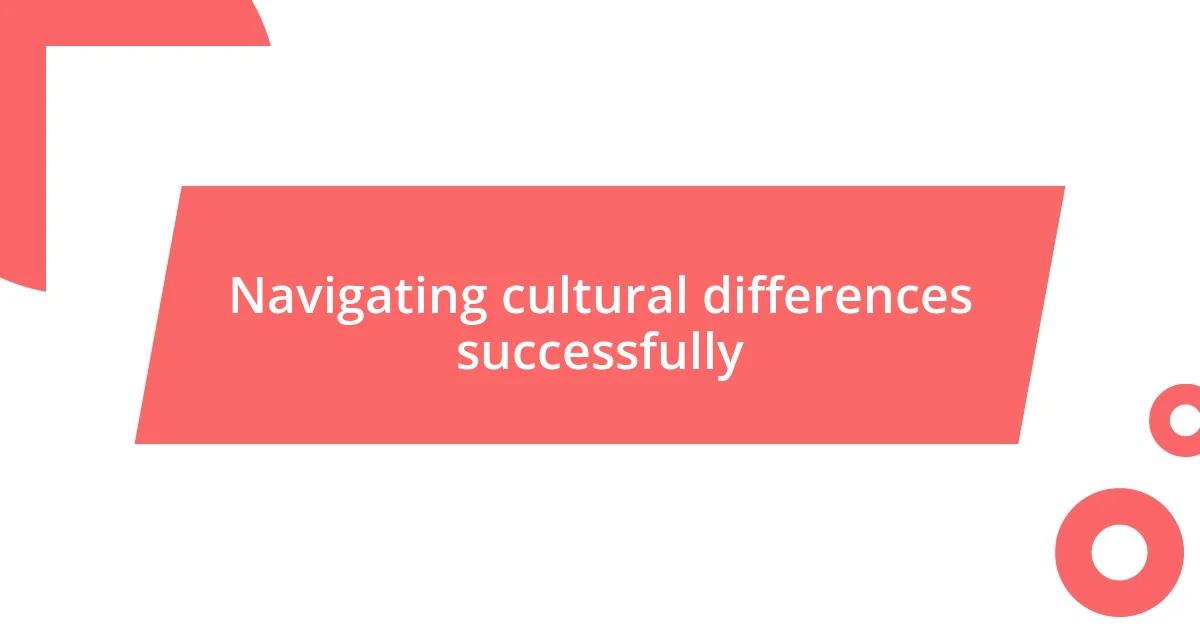
Navigating cultural differences successfully
Navigating cultural differences effectively has been one of the most rewarding challenges in my international experiences. In a recent project in Southeast Asia, I found that humor transcended language barriers. During one meeting, a lighthearted joke about local food broke the ice. Laughter not only lightened the mood but also fostered camaraderie among team members who previously felt hesitant to speak up. Isn’t it fascinating how a simple act can create bonds that language sometimes fails to establish?
In my journey, I’ve learned that flexibility is crucial when faced with differing customs. I remember attending a formal dinner in a Middle Eastern country, where the meal began with a specific ritual that I wasn’t aware of. Instead of feeling embarrassed, I watched and adapted my behavior accordingly. This experience made me realize that showing willingness to embrace and respect diverse traditions can pave the way for deeper relationships. Have you ever found yourself in a situation where adjusting your approach led to a newfound respect?
Moreover, patience plays a key role in this cultural navigation. During my time working with a team from Latin America, decision-making processes revealed differing speeds and methods. While it was initially frustrating, I learned to appreciate the value of taking time to build consensus. This taught me that time spent nurturing understanding can yield stronger commitments and better outcomes. How often do we rush into decisions without appreciating the diverse perspectives at play?
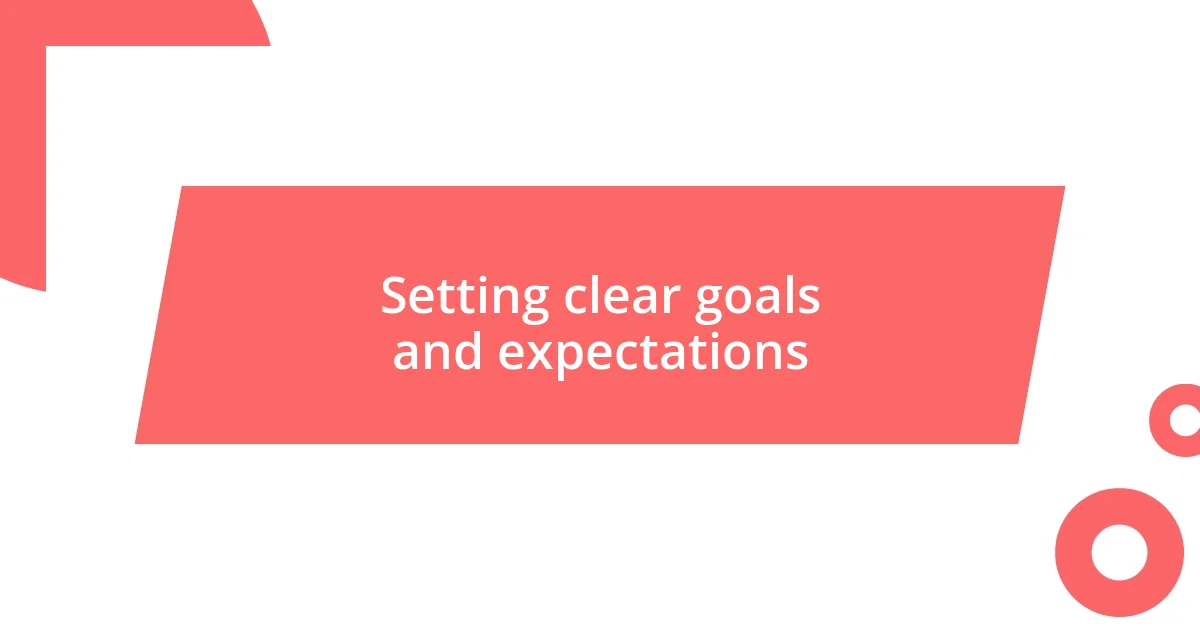
Setting clear goals and expectations
Setting clear goals and expectations is paramount in international cooperation. I recall a project where ambiguity led to mixed outcomes. We didn’t outline our objectives from the start, and as a result, team members had different interpretations of success. It was a wake-up call for me, reinforcing how vital it is to set a unified direction to avoid misalignment.
In a different experience, I found that involving all stakeholders in goal-setting created a sense of ownership. When we collaborated to define our expectations for a joint initiative, everyone felt invested in the outcomes. This collective input not only clarified our path but also boosted team morale. Have you ever noticed how shared goals can transform commitment from mere obligation into passionate involvement?
Additionally, regular check-ins to assess progress against those established goals are essential. I learned this lesson during a collaborative effort with partners in Europe. By scheduling consistent updates, we addressed potential issues early on, which minimized setbacks. It was comforting to see how aligning our expectations improved transparency and kept everyone on the same page. How often do we forget to recalibrate our goals during long-term projects? Small adjustments can lead to significant improvements.
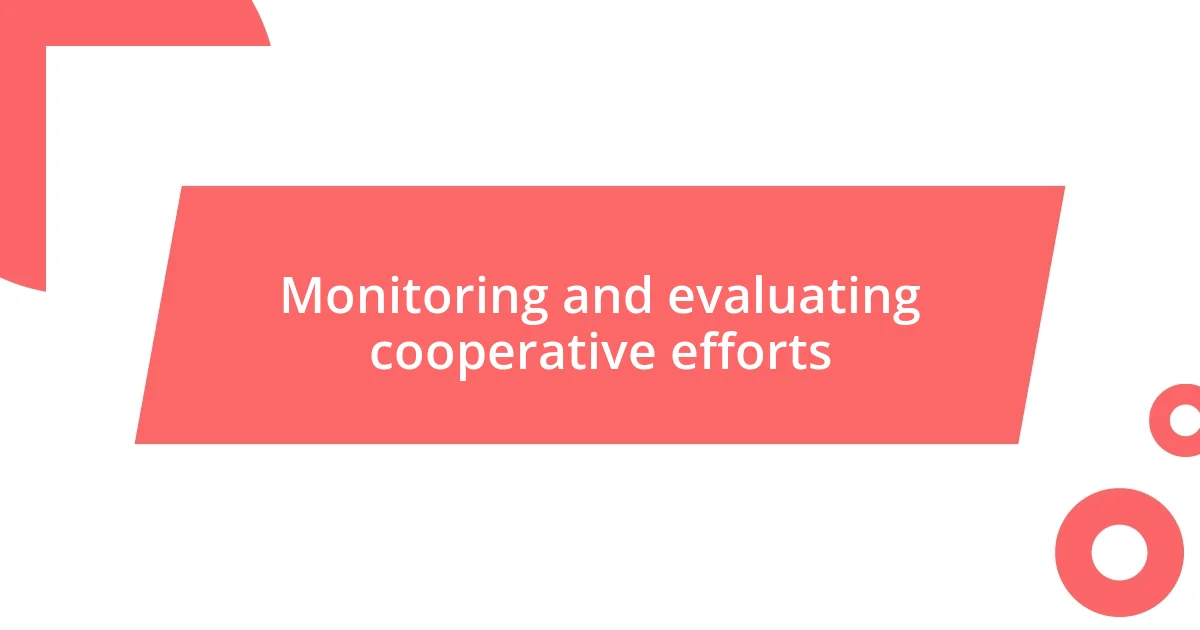
Monitoring and evaluating cooperative efforts
Monitoring and evaluating cooperative efforts is a vital practice that I find often overlooked. During a project focused on sustainable development, we implemented a feedback system that allowed us to capture the experiences and insights of all team members. This wasn’t just about measuring success; it became a platform for sharing stories of challenges and triumphs. Have you ever realized how much learning can come from simply listening to others’ experiences?
In my experience, I’ve discovered that using qualitative metrics can be just as important as quantitative ones. While working on a cross-border initiative, we leaned into storytelling to evaluate our impact. Participants shared their personal journeys, which illuminated the real-life effects of our efforts. It was an emotional reflection, highlighting not just what we achieved but the connections we forged. Isn’t it powerful how narratives can provide depth to data?
Furthermore, I’ve learned that iterative evaluations can lead to more agile responses. During a collaborative project, we established monthly reviews to assess our strategies. These sessions became a space for honest conversations, allowing us to pivot when necessary. Many times, this adaptive approach led to unexpected solutions that we hadn’t considered before. How valuable is it to have the flexibility to adjust course based on what we learn along the way?
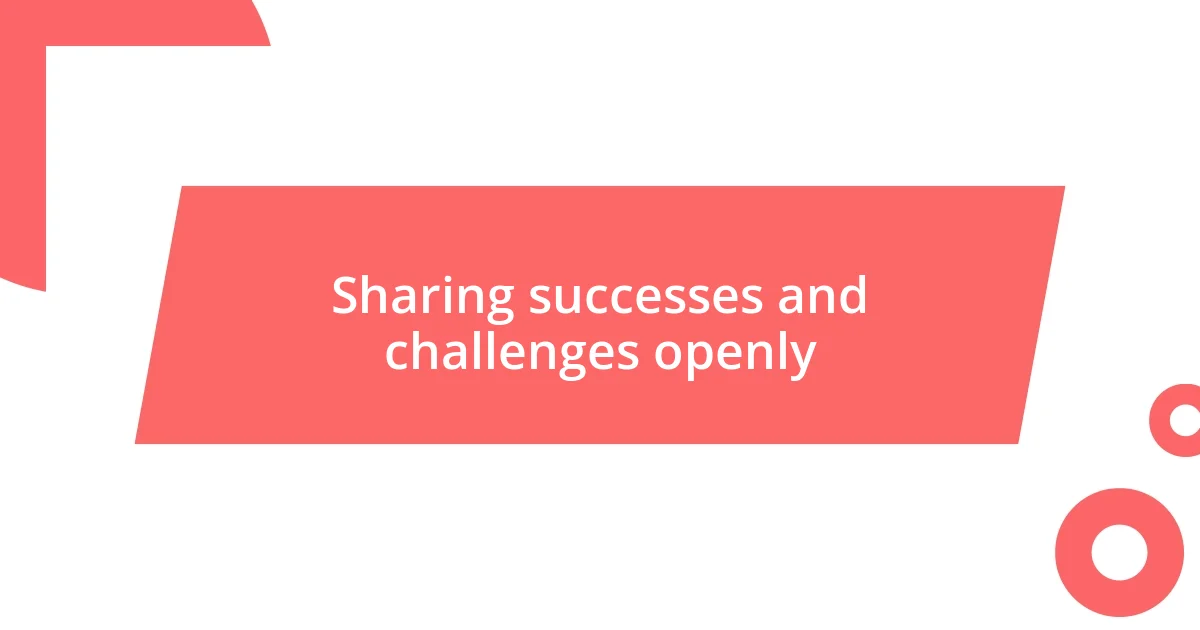
Sharing successes and challenges openly
Sharing successes and challenges openly is essential for building trust in international cooperation. I vividly recall a project where we organized a workshop to discuss not only our achievements but also the hurdles we faced. The atmosphere was surprisingly uplifting; admitting our struggles led to shared laughter and bonding moments. Have you experienced how vulnerability can actually strengthen a team’s dynamics?
In another instance, we implemented a practice of open forums, where team members could discuss their experiences candidly. One individual shared a setback that initially seemed disheartening but ended up sparking a brainstorming session filled with innovative solutions. This openness not only fostered collaboration but also highlighted the idea that every setback could pave the way for unexpected breakthroughs. Isn’t it enlightening how openly sharing challenges can lead to collective problem-solving?
I’ve also found that celebrating small victories together can significantly enhance team morale. During a long-term initiative, we made it a point to acknowledge even the minor wins during our debrief meetings. This habit created a positive feedback loop, motivating everyone to stay engaged and involved. Reflecting on these successes reminded me of the profound impact recognition has on our collective journey. How often do we take the time to appreciate the little wins in our projects? It’s a simple yet powerful practice that can create lasting solidarity.










